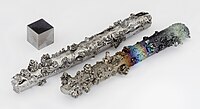
Photo from wikipedia
Tungsten ditelluride (WTe2) has many interesting properties such as its extremely large nonsaturating magnetoresistance and quantum spin Hall state in the monolayer limit. The anisotropic crystal structure of WTe2 can… Click to show full abstract
Tungsten ditelluride (WTe2) has many interesting properties such as its extremely large nonsaturating magnetoresistance and quantum spin Hall state in the monolayer limit. The anisotropic crystal structure of WTe2 can allow for isolation of particular crystal directions to study the predicted Weyl states or crystal-symmetry-dependent magnetoresistance when studied at limited dimensions. In particular, the recent demonstration of superconductivity in WTe2 monolayer suggests that realizing nanowire geometry for WTe2 may be important to investigate potential Majorana zero modes predicted in one-dimensional topological superconductors. In this work, we demonstrate a large-yield, low-temperature synthesis of WTe2 nanowires, an approximate one-dimensional system, by converting WO3 nanowires via tellurization. The nanowires are single crystalline and have a higher resistivity than WTe2 exfoliated flakes with similar thickness. The increased resistivity is attributed to increased scattering from imperfect surfaces and higher surface-to-volume ratios of the WTe2 nanowires. We demonstrate that the synthesis method is generalizable to other transition-metal dichalcogenides, laying the foundation for further study of this class of materials in the one-dimensional limit.
Journal Title: ACS nano
Year Published: 2019
Link to full text (if available)
Share on Social Media: Sign Up to like & get
recommendations!